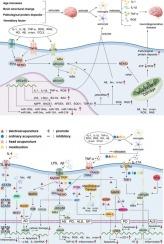NF-κB signalling pathway in neurodegenerative diseases: Acupuncture as a potential therapeutic approach
IF 2.6
4区 医学
Q3 NEUROSCIENCES
引用次数: 0
Abstract
The NF-κB signaling pathway plays a crucial role in the pathogenesis of neurodegenerative diseases, including Alzheimer’s disease, Parkinson’s disease, and amyotrophic lateral sclerosis, particularly through its role in the regulation neuroinflammation, oxidative stress, protein misfolding, and apoptosis. Emerging evidence suggests that acupuncture modulates the NF-κB pathway, thus offering therapeutic potential by mitigating neuroinflammation, reducing oxidative stress, and protecting mitochondrial function. Specifically, acupuncture inhibits NF-κB activation, downregulates pro-inflammatory mediators like TNF-α and IL-6, and mitigates neurotoxicity and apoptosis. These effects are substantiated in animal models of Alzheimer’s and Parkinson’s diseases, with preliminary evidence in amyotrophic lateral sclerosis models. However, current studies largely rely on preclinical models with limited acupoint selection, short observation periods, and a lack of standardized protocols, posing challenges for translation to clinical settings. Future research should prioritize well-designed clinical trials, expand acupoint combinations, and explore synergistic effects with conventional therapies, aiming to maximize acupuncture’s therapeutic efficacy in neurodegenerative diseases.

神经退行性疾病的NF-κB信号通路:针刺作为潜在的治疗方法。
NF-κB信号通路在阿尔茨海默病、帕金森病和肌萎缩侧索硬化症等神经退行性疾病的发病机制中起着至关重要的作用,特别是通过其调节神经炎症、氧化应激、蛋白质错误折叠和细胞凋亡。越来越多的证据表明,针灸可以调节NF-κB通路,从而通过减轻神经炎症、减少氧化应激和保护线粒体功能提供治疗潜力。具体而言,针刺可抑制NF-κB活化,下调TNF-α、IL-6等促炎介质,减轻神经毒性和细胞凋亡。这些影响在阿尔茨海默病和帕金森病的动物模型中得到证实,在肌萎缩侧索硬化症模型中有初步证据。然而,目前的研究主要依赖于临床前模型,穴位选择有限,观察时间短,缺乏标准化的方案,为临床环境的转化带来了挑战。未来的研究应优先设计临床试验,扩大穴位组合,探索与常规疗法的协同效应,以最大限度地提高针灸治疗神经退行性疾病的疗效。
本文章由计算机程序翻译,如有差异,请以英文原文为准。
求助全文
约1分钟内获得全文
求助全文
来源期刊

Brain Research
医学-神经科学
CiteScore
5.90
自引率
3.40%
发文量
268
审稿时长
47 days
期刊介绍:
An international multidisciplinary journal devoted to fundamental research in the brain sciences.
Brain Research publishes papers reporting interdisciplinary investigations of nervous system structure and function that are of general interest to the international community of neuroscientists. As is evident from the journals name, its scope is broad, ranging from cellular and molecular studies through systems neuroscience, cognition and disease. Invited reviews are also published; suggestions for and inquiries about potential reviews are welcomed.
With the appearance of the final issue of the 2011 subscription, Vol. 67/1-2 (24 June 2011), Brain Research Reviews has ceased publication as a distinct journal separate from Brain Research. Review articles accepted for Brain Research are now published in that journal.
 求助内容:
求助内容: 应助结果提醒方式:
应助结果提醒方式:


